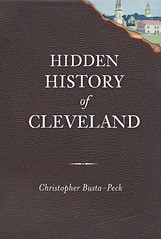With the coming demolition of the historic James H. Foster residence in the Ambler Heights neighborhood of Cleveland Heights, many people have asked what they can do. They've suggested that historic preservation legislation is needed - I agree.
Historic preservation laws can do quite a bit - if you look at the historic neighborhoods that are doing well in this area, many of them are where they are in part because they are part of landmark districts. These neighborhoods are often in better condition and have higher property values than the surrounding areas.
Landmarks legislation is only part of the picture. It's hard to get such legislation with real teeth. It can slow down the demolition process, but often little more than that, if the owner is determined. It's worth pursuing, mind you - and if you want to proceed forward in this regard, talk to your city council member (or euqivalent).
I don't know of any landmarks legislation in the greater Cleveland area that would have protected the owners of the James H. Foster residence from completely gutting the interior - and the interior is at least as significant as the exterior. With any residence, once the interior is gone, the excuse will pop up at demolition hearings that "most of the historic detail is gone, so we should be allowed to bulldoze it."
This is why, if we are to protect the history of our community, we need to take an additional step - we need to take a more active interest in this history. We need to *gasp* talk with our neighbors and tell them that we're concerned about our history. We need to become more interested in the history of the area as a whole, rather than to just be content that we're maintaining the status quo in our individual communities.
Further, it means that we'll have to figure out how to explain why we're concerned with these issues. Is it because we find the stories of those who came before us fascinating? Is it because we love the aesthetic of the beautiful old buildings? Or is it just because we want to continue to live in an area where there are historic buildings in addition to the ones that we, personally, live in?
All are valid reasons. Each of us needs to figure out how to express this to our neighbors, because while we can work for legislation, none of this will be effective without the community as a whole being more interested in our history.
You say you don't know that much about our history? That's fine. Take a look at the books at your local library branch - see if any of them deal with your neighborhood. Bring up a story you read here, on Cleveland Area History, about a historic farmhouse, for instance, and ponder if something like that might exist in your neighborhood.
Individually, all we have to do is start a dialogue with our neighbors. We're making progress. Now we have to start actually talking to other people, instead of just talking amongst ourselves.
Tuesday, February 22, 2011
Historic Preservation: What You Can Do
Labels:
historic preservation
Subscribe to:
Post Comments (Atom)




No comments:
Post a Comment